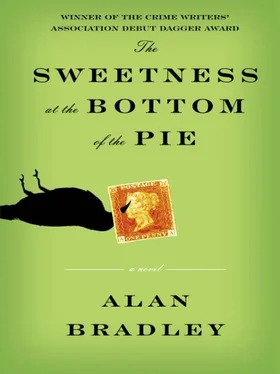Alan Bradley - The Sweetness at the Bottom of the Pie
Здесь есть возможность читать онлайн «Alan Bradley - The Sweetness at the Bottom of the Pie» весь текст электронной книги совершенно бесплатно (целиком полную версию без сокращений). В некоторых случаях можно слушать аудио, скачать через торрент в формате fb2 и присутствует краткое содержание. Жанр: Старинная литература, на английском языке. Описание произведения, (предисловие) а так же отзывы посетителей доступны на портале библиотеки ЛибКат.
- Название:The Sweetness at the Bottom of the Pie
- Автор:
- Жанр:
- Год:неизвестен
- ISBN:нет данных
- Рейтинг книги:3 / 5. Голосов: 1
-
Избранное:Добавить в избранное
- Отзывы:
-
Ваша оценка:
- 60
- 1
- 2
- 3
- 4
- 5
The Sweetness at the Bottom of the Pie: краткое содержание, описание и аннотация
Предлагаем к чтению аннотацию, описание, краткое содержание или предисловие (зависит от того, что написал сам автор книги «The Sweetness at the Bottom of the Pie»). Если вы не нашли необходимую информацию о книге — напишите в комментариях, мы постараемся отыскать её.
The Sweetness at the Bottom of the Pie — читать онлайн бесплатно полную книгу (весь текст) целиком
Ниже представлен текст книги, разбитый по страницам. Система сохранения места последней прочитанной страницы, позволяет с удобством читать онлайн бесплатно книгу «The Sweetness at the Bottom of the Pie», без необходимости каждый раз заново искать на чём Вы остановились. Поставьте закладку, и сможете в любой момент перейти на страницу, на которой закончили чтение.
Интервал:
Закладка:
Here comes that old “King George is not a frivolous man” speech again, I thought, but Inspector Hewitt had decided to wait for my answer, no matter how long it was in coming.
"There isn't much to do at Buckshaw," I said. "Some times I do things just to keep from getting bored."
He held out the black gown and cap. “And that's why you're wearing this costume? To keep from getting bored?”
"It's not a costume," I said. "If you must know, I found them under a loose tile on the tower roof. They have something to do with Mr. Twining's death. I'm sure of it."
If Mr. Ruggles's eyes had bulged before, they now almost popped out of his head.
"Mr. Twining?" he said. "Mr. Twining as jumped off the tower?"
"Mr. Twining didn't jump," I said. I couldn't resist the temptation to get even with this nasty little man. "He was—"
"Thank you, Flavia," Inspector Hewitt said. "That will do. And we'll take up no more of your time, Mr. Ruggles. I know you're a busy man."
Ruggles puffed himself up like a courting pigeon, and with a nod to the Inspector and an impertinent smile at me, he set off across the lawn towards his quarters.
"Thank you for your report, Mr. Plover," the Inspector said, turning to the man in overalls, who had been standing silently by.
Mr. Plover tugged at his forelock and returned to his tractor without a word.
"Our great public schools are cities in miniature," the Inspector said, with a wave of his hand. "Mr. Plover spotted you as an intruder the instant you turned into the lane. He wasted no time in getting to the porter's lodge."
Damn the man! And damn old Ruggles too! I'd have to remember when I got home to send them a jug of pink lemonade, just to show that there were no hard feelings. It was too late in the season for anemones, so anemonin was out of the question. Deadly nightshade, on the other hand, although uncommon, could be found if you knew exactly where to look.
Inspector Hewitt handed the cap and gown to Sergeant Graves, who had already produced several sheets of tissue paper from his kit.
"Smashing," the sergeant said. "She might just have saved us a crawl across the slates."
The Inspector shot him a look that could have stopped a runaway horse.
"Sorry, sir," the sergeant said, his face suddenly aflame as he turned to his wrapping.
"Tell me, in detail, how you found these things," Inspector Hewitt said, as if nothing had happened. "Don't leave anything out—and don't add anything."
As I spoke he wrote it all down in his quick, minuscule hand. Because of sitting across from Feely as she wrote in her diary at breakfast, I had become rather good at reading upside down, but Inspector Hewitt's notes were no more than tiny ants marching across the page.
I told him everything: from the creak of the ladders to my near-fatal slip; from the loose tile and what lay behind it to my clever escape.
When I had finished, I saw him scribble a couple of characters beside my account, although what they were, I could not tell. He snapped the notebook shut.
"Thank you, Flavia," he said. "You've been a great help."
Well, at least he had the decency to admit it. I stood there expectantly, waiting for more.
"I'm afraid King George's coffers are not deep enough to ferry you home twice in twenty-four hours," he said, "so we'll see you on your way."
"And shall I come back with tea?" I asked.
He stood there with his feet planted in the grass, and a look on his face that might have meant anything. A minute later, Gladys's Dunlop tires were humming happily along the tarmac, leaving Inspector Hewitt—“and his ilk” as Daffy would have said—farther and farther behind.
Before I had gone a quarter of a mile, the Vauxhall overtook, and then passed me. I waved like mad as it went by, but the faces that stared out at me from its windows were grim.
A hundred feet farther on, the brake lights flashed and the car pulled over onto the verge. As I came alongside, the Inspector rolled the window down.
"We're taking you home. Sergeant Graves will load your bicycle into the boot."
"Has King George changed his mind, Inspector?" I asked haughtily.
A look crossed his face that I had never seen there before. I could almost swear it was worry.
"No," he said, "King George has not changed his mind. But I have.”
19
NOT TO BE TOO DRAMATIC ABOUT IT, THAT NIGHT I slept the sleep of the damned. I dreamt of turrets and craggy ledges where the windswept rain blew in from the ocean with the odor of violets. A pale woman in Elizabethan dress stood beside my bed and whispered in my ear that the bells would ring. An old salt in an oilcloth jacket sat atop a piling, mending nets with an awl, while far out at sea a tiny aeroplane winged its way towards the setting sun.
When at last I awoke, the sun was at the window and I had a perfectly wretched cold. Even before I went down to breakfast I had used up all the handkerchiefs from my drawer and put paid to a perfectly good bath towel. Need less to say, I was not in a good humor.
"Don't come near me," Feely said as I groped my way to the far end of the table, snuffling like a grampus.
"Die, witch," I managed, making a cross of my fore fingers.
"Flavia!"
I poked at my cereal, giving it a stir with a corner of my toast. In spite of the burnt bits of crust to liven it up, the soggy muck in the bowl still tasted like cardboard.
There was a jerk, a jump in my consciousness like a badly spliced cinema film. I had fallen asleep at the table.
"What's wrong?" I heard Feely ask. "Are you all right?"
"She is stuck in her 'enervating slumbers, from the hesternal dissipation or debauch,'" Daffy said.
Daffy had recently been reading Bulwer-Lytton's Pelham , a few pages each night for her bedtime book, and until she finished it, we were likely to be lashed daily at breakfast with obscure phrases in a style of prose as stiff and inflexible as a parlor poker.
Hesternal , I remembered, meant, “pertaining to yesterday.” I was nodding over the rest of the phrase when suddenly Feely leapt up from the table.
"Good God!" she exclaimed, quickly wrapping her dressing gown round her like a winding-sheet. "Who on earth is that?"
Someone stood silhouetted at the French doors, peering in at us through hands cupped against the glass.
"It's that writer," I said. "The country house man. Pemberton."
Feely gave a squeak and fled upstairs where I knew she would throw on her tight blue sweater set, dab powder on her morning blemishes, and float down the staircase pretending she was someone else: Olivia de Havilland, for instance. She always did that when there was a strange man on the property.
Daffy glanced up disinterestedly, and then went on reading. As usual, it was up to me.
I stepped out onto the terrace, pulling the door closed behind me.
"Good morning, Flavia," Pemberton said with a grin. "Did you sleep well?"
Did I sleep well? What kind of question was that? Here I was on the terrace, sleep in my eyes, my hair a den of nesting rats, and my nose running like a trout stream. Be sides, wasn't a question about the quality of one's sleep reserved for those who had spent a night under the same roof? I wasn't sure; I'd have to look it up in Beeton's Complete Etiquette for Ladies . Feely had given me a copy for my last birthday, but it was still propping up the short leg of my bed.
"Not awfully," I said. "I've caught cold."
"I'm sorry to hear that. I was hoping to be able to interview your father about Buckshaw. I don't like to be a pest, but my time here is limited. Since the war, the cost of accommodation away from home, even in the most humble hostelry, such as the Thirteen Drakes, is simply shocking. One doesn't like to plead poverty, but we poor scholars still dine mostly upon bread and cheese, you know."
Читать дальшеИнтервал:
Закладка:
Похожие книги на «The Sweetness at the Bottom of the Pie»
Представляем Вашему вниманию похожие книги на «The Sweetness at the Bottom of the Pie» списком для выбора. Мы отобрали схожую по названию и смыслу литературу в надежде предоставить читателям больше вариантов отыскать новые, интересные, ещё непрочитанные произведения.
Обсуждение, отзывы о книге «The Sweetness at the Bottom of the Pie» и просто собственные мнения читателей. Оставьте ваши комментарии, напишите, что Вы думаете о произведении, его смысле или главных героях. Укажите что конкретно понравилось, а что нет, и почему Вы так считаете.












